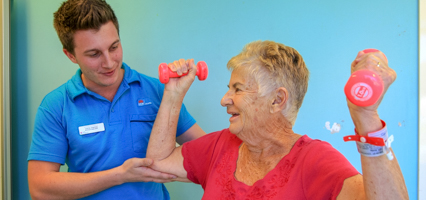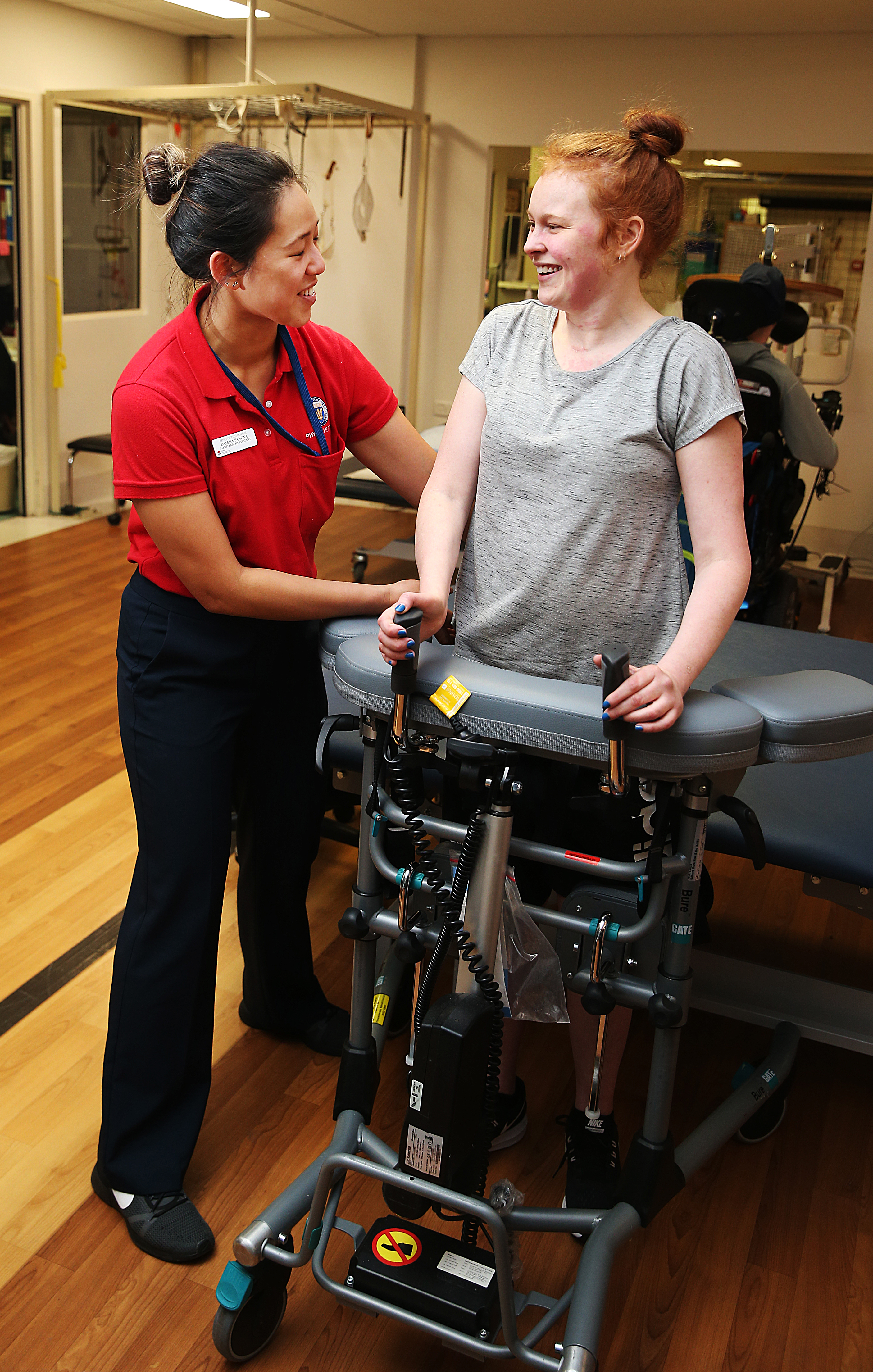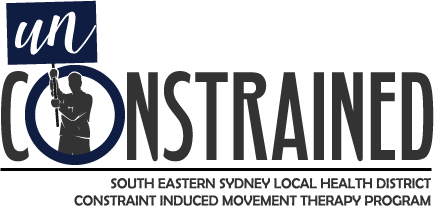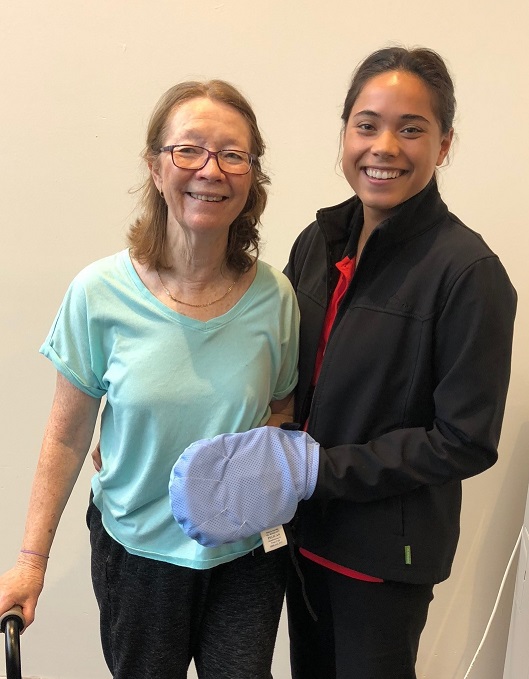This is for SSEH

Physiotherapy
How can we help you
Our Physiotherapists can help you improve your movement and function. We work with you to assess your needs, set goals and provide treatments and exercise programs to help you reach your goals.
Our Physiotherapists are highly trained and can provide the following treatments:
- exercise programs to improve mobility and strengthen muscles
- joint mobilisation to reduce pain and stiffness
- muscle re-education to help you control your movements
- breathing exercises and techniques to help you clear your airways
- assistance with use of aids, splints, crutches and walking sticks
- education regarding your condition and how you can help manage it yourself.
Corner of Belgrave and Kensington Streets, Kogarah NSW 2217
Clinic Hours
8.00am - 4.30pm Monday to Friday.
-33.966038202729, 151.13397631177
We can help you if you have problems with pain or movement caused by injury or disease. We look after patients staying in St George Hospital and those in the community who have been referred to one of our outpatient clinics.
Our outpatient clinics are for those living in the community. In the clinics we look after patients needing therapy for:
- Musculoskeletal disorders (bone, muscles and joint disorders)
- Hand surgery
- Lymphoedema
- Women’s, Men’s and pelvic health
- Cardiac Rehabilitation
- Pulmonary Rehabilitation
We are teaching hospital, and you may be asked to be involved in research or for a student to be present at your appointment. You may also be asked if a student may treat you. You have a right to say no. If you do so, this will not impact in any way on the services we will provide.
Please let us know if you need an interpreter. You can contact us by telephoning the Translating and Interpreting Service (TIS) on 131 450. Tell the operator what language you speak and then ask the interpreter to set up a telephone conversation between you, an interpreter, and the healthcare professional you want to speak with.
Head of Physiotherapy Department: Susan Sellars
Physiotherapy
Our Physiotherapy team is here to help you improve your movement and general function.
We work with you to:
• Understand your needs
• Set goals
• Create personalized treatment and exercise plans to support your progress.
Our physiotherapists offer a range of treatments, including:
• Special exercise program to help you with your walking and to make your muscles strong
• Breathing exercises and techniques to help clear your airways
• Education and exercises to help prevent falls
• Guidance on using mobility aids such as splints, crutches, and walking sticks
Before you go home, we will:
• Help with discharge planning
• When appropriate organise a referral to community or outpatient physiotherapy and other services
We are here to support you on your journey to better movement and well-being.
You can contact the Physiotherapist through the Hospital switchboard on (02) 9382 7111.
Sydney, NSW, 2001
-33.8684884, 151.2124807
Physiotherapy
Our Physiotherapy team is here to help you improve your movement and general function.
We work with you to:
• Understand your needs
• Set goals
• Create personalized treatment and exercise plans to support your progress.
Our physiotherapists offer a range of treatments, including:
• Special exercise program to help you with your walking and to make your muscles strong
• Breathing exercises and techniques to help clear your airways
• Education and exercises to help prevent falls
• Guidance on using mobility aids such as splints, crutches, and walking sticks
Before you go home, we will:
• Help with discharge planning
• When appropriate organise a referral to community or outpatient physiotherapy and other services
We are here to support you on your journey to better movement and well-being.
You can contact the Physiotherapist through the Hospital switchboard on (02) 9382 7111.
Sydney, NSW, 2001
-33.8684884, 151.2124807
Physiotherapy - Royal Hospital for Women
How we can help you
Our Physiotherapy department can help you improve your bladder, bowel and sexual health. We work with you to assess your needs, set goals and provide treatments and exercise programs to help you reach your goals. Our services are accessible to women, men and gender diverse people living with:
- Breast and gynaecology cancer treatment and common symptoms/side effects
- Bladder, bowel and sexual disorders
- Conditions specific to pregnancy & childbirth
- Symptoms of menopause
- Lymphoedema of the arms and legs
We do this by:
- Finding out what the problem is when you come to your first appointment
- Understanding your needs and concerns
- Working with you to come up with a plan of how exercise can help you both in the short and long term
- Providing support for self-management
We offer both individual services as well as group based programs.
Randwick, NSW 2031
Manager
Kimia Sharifi Nasab, Acting Head of Department
Opening times
8:30am - 4:00pm Monday - Friday
Referrals
Send referrals via email: SESLHD-PhysioRHW-Refer@health.nsw.gov.au
How to find us
Physiotherapy Department, Level 0, Royal Hospital for Women (Building 17 on our campus map)
-33.918985810091, 151.23821843381
We can help you if you have problems with bladder or bowel function, sexual health, pain or movement caused by injury or disease. We look after patients staying at The Royal Hospital for Women and those in the community who have been referred to one of our outpatient clinics. We also see patients referred from outpatient clinics on campus, for example:
- RHW gynaecology oncology outpatients
- POWH/RHW Breast Service
- POWH Urology department
- RHW gynaecology outpatients
- UNSW Lifestyle Clinic
- RHW/POWH pain clinics
Our outpatient clinics are for those living in the community. Our clinics include:
- Physiotherapy outpatient service: We care for people living in the community with problems with their bladder, bowel and sexual health. We also support people as they recover from or plan to have surgery for example, breast, prostate and gynaecological surgery.
- Cancer Prehab and Rehab: We help people having cancer treatment (chemotherapy, radiation, surgery) by providing exercise plans, education, social support and self-management advice to improve response to cancer treatment, reduce cancer-related fatigue and manage side effects.
- Gestational diabetes GYM: We run exercise programs in the physiotherapy gymnasium to support people with diabetes in pregnancy improve their glucose control; provide follow-up after birth via our postnatal lifestyle session and prevent a diagnosis of diabetes for pregnant people who might be at risk.
- EMBODY: We provide virtual weekly group physiotherapy during pregnancy and after birth. The EMBODY program has been designed to be completed weekly during pregnancy and for up to 3-6 months after having a baby. The program combines movement with education to prevent common pelvic floor problems and improve the health of childbearing people. It’s a great way to get your pelvic floor exercises done!
Our team includes trained pelvic floor physiotherapists, student physiotherapists and visiting physiotherapists completing training in pelvic health who will be responsible for your assessment and physiotherapy treatment plan.
We work in partnership with specialist nurses, midwives, medical and surgical specialists and your local doctor (GP).
Our administration officers can help you with bookings, referral management and telephone enquires.
We provide options to attend physiotherapy appointments and exercise programs via telehealth. This means that we communicate with you through a video link on your computer screen. We recommend attending your first appointment in person. If you would like to attend subsequent appointments via telehealth, you can discuss whether this option is suitable for you with your physiotherapist.
Health professional referral:
To come to the Physiotherapy Outpatient Department you will need to have your local doctor (GP) or treating specialist write you a referral letter explaining your relevant surgical and medical history. The referral may then be mailed, emailed or faxed to us or you can bring it into our department in person.
To make or cancel an appointment please telephone 9382 6540.
We try to see all of our patients as quickly as possible. However, we have a large number of patients seeking treatment. Appointments are offered based on urgency. Urgent conditions are generally given an appointment within a few days of receiving the referral. Non-urgent conditions may need to go on a waiting list. It can take up to 2 months for non-urgent conditions to receive an appointment.
Can I chose the day and time I attend appointments?
We will try to find appointment times that suit your availability. Our hours of operation however are 8:30am - 4:00pm Monday to Friday. We do not offer weekend treatments.
Self-referral for Physiotherapy services:
Referrals can be faxed to us: 9382 6561 or patients can call to make a self referral on 9382 6540
We are a teaching hospital and you may be asked to be involved in research or for a student to be present at your appointment. You have a right to say no. If you do so, this will not impact in any way on the services we will provide. All physiotherapists in our team are committed to achieving the best possible health outcome for you and complete regular supervision with a senior or specialist physiotherapist. You can ask your physiotherapist if your care can be reviewed with a senior or specialist physiotherapist and your physiotherapist might suggest this from time to time.
Please let us know if you need an interpreter. You can contact us telephoning the Translating and Interpreting Service (TIS) on 131 450. Tell the operator what language you speak and then ask the interpreter to set up a telephone conversation between you, an interpreter, and the healthcare professional you want to speak with.
Share your experience of our service by contacting: 02 9382 6849 or emailing: SESLHD-RHWfeedback@health.nsw.gov.au
Allied Health
In addition to the expert medical care and support provided by our nurses, doctors and midwives at the Royal Hospital for Women, we have an expert team of Allied Health Staff. Allied Health Professionals are highly qualified and skilled professionals who work with you to prevent, diagnose and treat a wide range of illnesses and conditions. We provide high quality evidence based care with a multidisciplinary focus to ensure that your physical, psychological and social needs are addressed. We provide care across the lifespan from newborn to aged care and in hospital, community, home and outpatient settings.
Allied Health play an important role in supporting you to return to your best level of function, and to stay well and out of hospital.
Find information about Allied Health services at the Royal Hospital for Women from the following pages:
How to find us
Royal Hospital for Women (Building 17 on our campus map)
-33.91894269299, 151.23823785512
Physiotherapy- Prince of Wales Hospital
How we can help you
Our Physiotherapy department can help you improve your movement and function. We work with you to assess your needs, set goals and provide treatments and exercise programs to help you reach your goals.
Our Physiotherapists are highly trained and can provide the following treatments:
- exercise programs to improve mobility and strengthen muscles
- joint mobilisation to reduce pain and stiffness
- muscle re-education to help you control your movements
- breathing exercises and techniques to help you clear your airways
- assistance with use of aids, splints, crutches, walking sticks and wheelchairs
- education regarding your condition and how you can help manage it yourself.
Manager
Daniel Treacy, Head of Department
Tim Morocombe, Deputy Head of Department
Opening times
8.00am - 4.30pm Monday - Friday
How to find us
Physiotherapy Department, Level 1, High Street Building, Prince of Wales Hospital (Building 2 on our campus map)

We can help you if you have problems with pain or movement caused by injury or disease. We look after patients staying at Prince of Wales Hospital and those in the community who have been referred to one of our outpatient clinics.
Our outpatient clinics are for those living in the community. Our clinics include:
- Physiotherapy outpatient service - we care for people living in the community with problems with their bones and muscles caused by disease, trauma or overuse. We also support people as they recover from surgery.
- Hydrotherapy outpatient service - we use pool exercises to help people reduce any pain or problems you may have with your bones and muscles
- Pulmonary and Heart Failure Rehabilitation Program - we help people with long-term lung and heart problems by providing exercise plans, education, training on how to self-manage your health and social support.
We are teaching hospital and you may be asked to be involved in research or for a student to be present at your appointment. You have a right to say no. If you do so, this will not impact in any way on the services we will provide.
Please let us know if you need an interpreter. You can contact us telephoning the Translating and Interpreting Service (TIS) on 131 450. Tell the operator what language you speak and then ask the interpreter to set up a telephone conversation between you, an interpreter, and the healthcare professional you want to speak with.
Constraint Induced Movement Therapy (CIMT)
|
Constraint Induced Movement Therapy (CIMT) is a therapy program that can be used to improve the strength, use and function of a weak arm and hand following a stroke or acquired brain injury. It is an intensive program that will be run over a 2 week clinic at Prince of Wales Hospital, St George Hospital and Sutherland Hospital each year. It involves the encouragement of use of the weak (or affected arm) and restraint of the strong (or unaffected arm). Participants will be required to participate in 4 hours of therapy per day, with an additional 1 hour of homework and commit to wearing the restraint (in the form of a soft mitt) for most of the day. Though intensive, the results for the right people are better than usual therapy, and have strong supporting evidence from the living stroke guidelines (National Stroke Foundation Australia). Participants must have some movement in their wrist and fingers and be able to consent to the program. |
|
Please click on the box which best describes you:
I am a stroke survivor or carer |
I am a health professional |
I want to make a referral |
I want to contact you |

St George Hospital, Gray Street, Kogarah, 2217
Sutherland Hospital, The Kingsway, Caringbah, 2229

